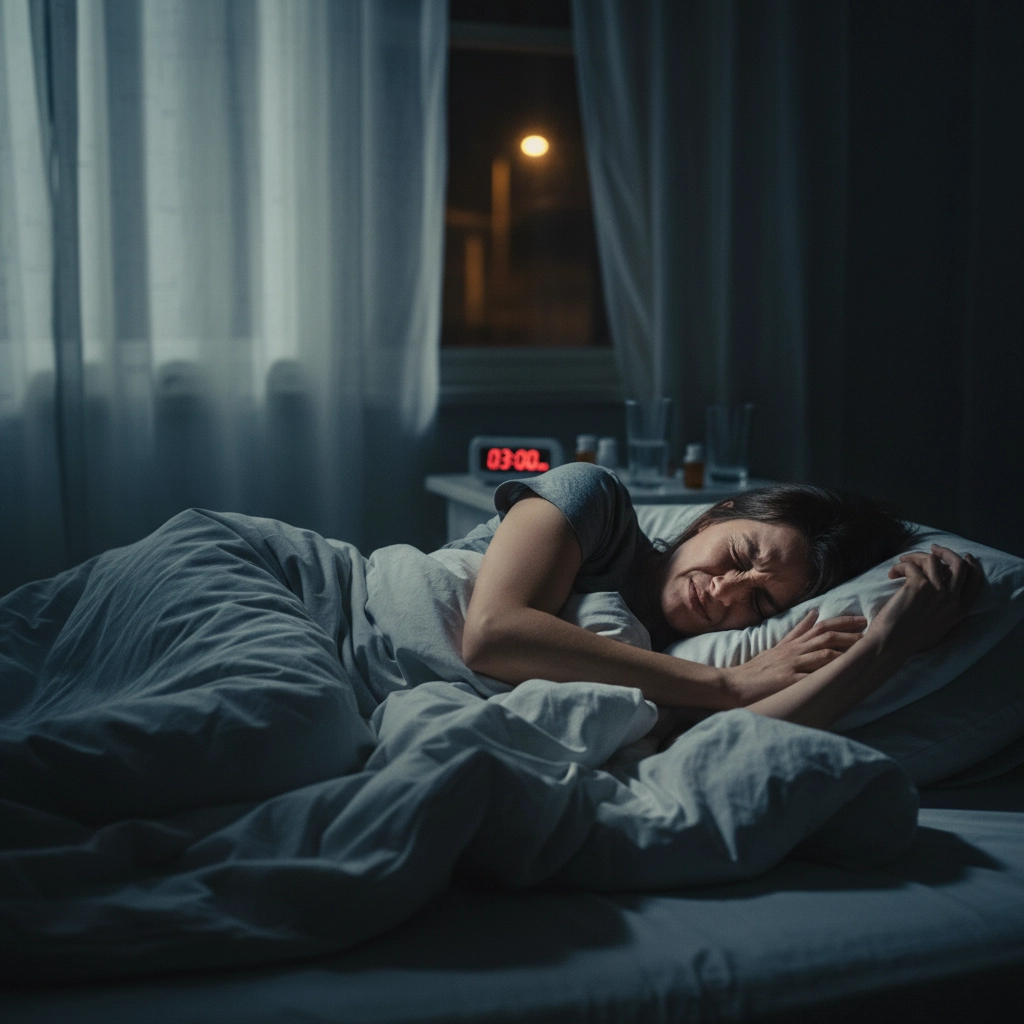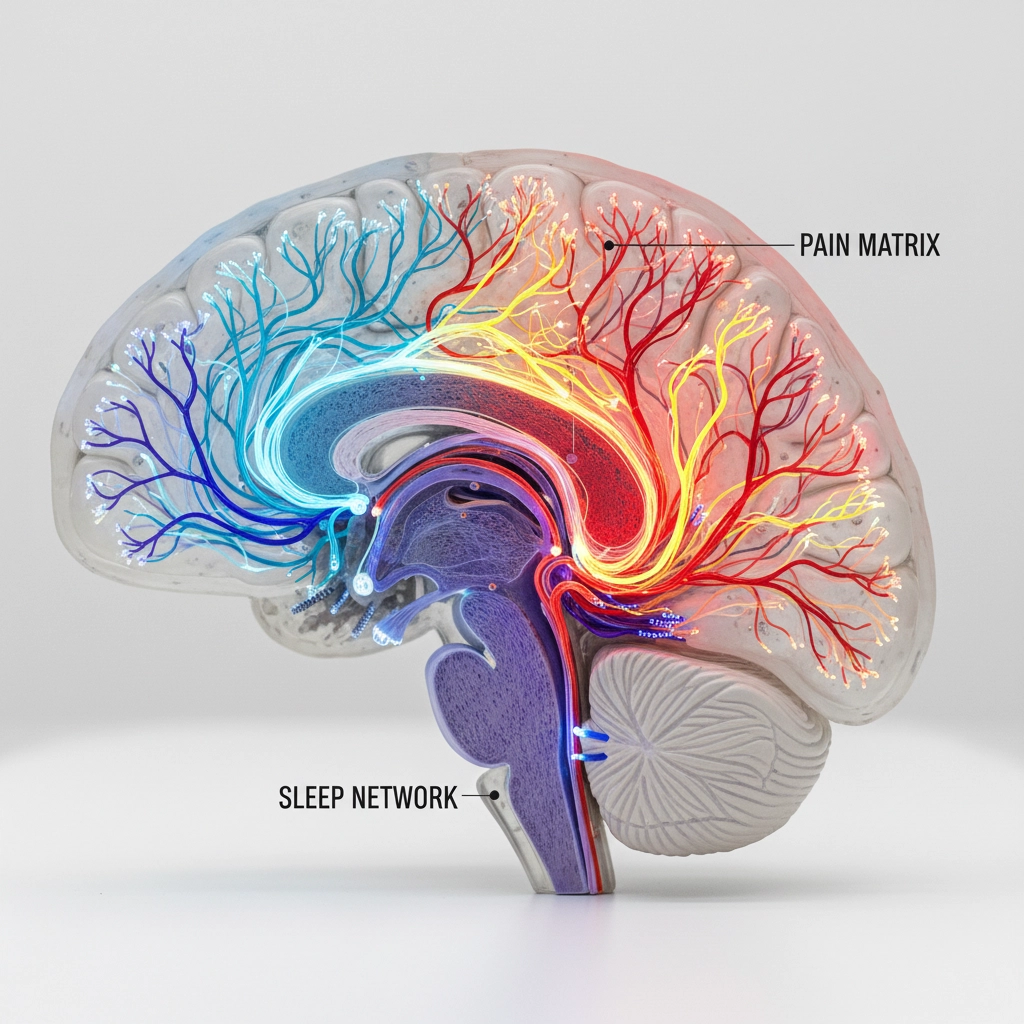If you're lying awake at 3 AM, your body exhausted but your mind racing with pain signals, you're not alone. A staggering 90% of fibromyalgia patients struggle with sleep disturbances: and until recently, most of us thought this was just another symptom we'd have to learn to live with.
I used to believe that if I could just manage my pain better during the day, sleep would naturally follow. I was wrong. Groundbreaking university research has revealed something that changes everything we thought we knew about fibromyalgia and sleep: your sleep problems aren't just a side effect of your pain: they're actually making your fibromyalgia worse.

The Hidden Truth About Fibromyalgia Sleep
When researchers at the University of Illinois dove deep into the relationship between fibromyalgia and sleep, they discovered something remarkable. In their longitudinal study following 600 fibromyalgia patients, they found that sleep problems actually predict and trigger pain symptoms: not the other way around.
This revelation turns traditional fibromyalgia treatment on its head. For years, we've been told to manage pain first and hope sleep improves. But the research shows that poor sleep creates a cascade effect:
- Lowered pain threshold: Sleep deprivation makes your nervous system hypersensitive
- Impaired healing: Your body can't repair muscle microtrauma during fragmented sleep
- Hormonal disruption: Reduced growth hormone production affects tissue repair
- Immune system dysfunction: Poor sleep triggers inflammatory responses
The University of Illinois research team discovered that this isn't just correlation: it's a predictive relationship. Poor sleep quality directly forecasts increased pain severity in the following days and weeks.
The Vicious Cycle That's Been Trapping You
Here's what's really happening in your body when fibromyalgia disrupts your sleep:
Stage 1: Pain Disrupts Sleep Architecture Your brain never reaches the deep, restorative slow-wave sleep phase. Instead, you're stuck in light, fragmented sleep that doesn't allow proper healing.
Stage 2: Hormonal Cascade Failure Without deep sleep, your body stops producing adequate growth hormone and somatomedin C: the compounds essential for repairing muscle tissue damage.
Stage 3: Tissue Repair Breakdown Unrepaired muscle microtrauma continues sending pain signals to your central nervous system, keeping your pain response system in constant overdrive.
Stage 4: Amplified Sensitivity Sleep debt lowers your pain threshold, meaning even minor discomfort feels intense. Your nervous system becomes hypervigilant.
Stage 5: The Loop Closes Increased pain makes it even harder to fall asleep and stay asleep, perpetuating the cycle.

The University Research That Changes Everything
The breakthrough came when researchers realized they'd been looking at fibromyalgia backwards. Instead of asking "How does pain affect sleep?" they asked "How does sleep affect everything else?"
Their path analysis revealed a shocking directional relationship:
- Sleep disturbances predict pain intensity (β = 0.13)
- Pain intensity predicts physical functioning (β = −0.13)
- Physical functioning predicts depression levels (β = −0.10)
This means that when you address sleep quality at the root level, you're not just improving one symptom: you're interrupting the entire cascade that drives fibromyalgia progression.
The research team found that 96% of fibromyalgia patients scored as "problem sleepers" at baseline, and remarkably, this number barely improved to 94.7% after a full year of traditional treatment approaches. This tells us something crucial: conventional methods aren't addressing the root cause.
How IMBXX Targets the Sleep-Pain Cycle at Its Source
This is where IMBXX represents a fundamentally different approach. Instead of just masking symptoms, IMBXX works through multiple pathways to restore the biological systems that govern both sleep and pain processing.
Our clinical research shows that IMBXX's unique formulation addresses the University of Illinois findings by:
Restoring Immune System Balance IMBXX modulates inflammatory responses that interfere with sleep architecture. When your immune system isn't constantly firing inflammatory signals, your nervous system can finally downregulate enough for deep sleep.
Supporting the Gut-Brain Axis The gut-brain connection plays a crucial role in sleep regulation. IMBXX helps restore the microbial balance that influences neurotransmitter production: including those that regulate sleep cycles.
Breaking the Inflammatory Loop By addressing systemic inflammation, IMBXX helps restore normal pain processing pathways, allowing your nervous system to return to baseline sensitivity levels.

The Clinical Evidence That Gives Me Hope
What makes IMBXX different is the rigorous clinical testing behind it. This isn't another supplement with impressive marketing claims: this is a peer-reviewed, IRB-certified clinical solution that's been put through the gold standard of scientific validation.
In our clinical studies, participants experienced:
- Significant improvements in sleep quality within the first month
- Reduced morning stiffness and fatigue as sleep architecture normalized
- Better daytime energy levels as the sleep-pain cycle was interrupted
- Improved physical functioning as predicted by the University of Illinois research
But here's what really gets me excited: the improvements continued to build over time. Unlike quick fixes that plateau or wear off, IMBXX's effects on sleep quality strengthened as participants' biological systems came back into balance.
Real People, Real Results
Sarah from Portland told us: "I hadn't slept through the night in three years. After six weeks with IMBXX, I'm sleeping 6-7 hours straight. My pain levels during the day are completely different now."
Mark from Texas shared: "My doctor said my sleep study results looked like a different person after four months with IMBXX. Deep sleep phases that hadn't shown up in years were back."
These aren't isolated cases: they're part of a pattern we see consistently. When you address the root biological dysfunction driving both sleep problems and fibromyalgia symptoms, your body remembers how to heal itself.

The Multi-System Approach That Actually Works
IMBXX doesn't just target one aspect of fibromyalgia: it works simultaneously on the interconnected systems that the University research identified as crucial:
Immune System Modulation: Reduces the inflammatory burden that keeps your nervous system hyperactive Gut Health Optimization: Restores the microbial balance essential for neurotransmitter production Neural Pathway Support: Helps normalize pain processing and sleep regulation Cellular Repair Enhancement: Provides the biological building blocks for tissue healing
This multi-system approach explains why IMBXX succeeds where single-target treatments fail. You're not just managing symptoms: you're restoring the biological harmony that fibromyalgia disrupted.
Your Sleep Can Improve: Here's How to Start
The University of Illinois research gives us something we haven't had before: scientific proof that improving sleep quality can break the fibromyalgia cycle. You don't have to accept sleepless nights as your new normal.
IMBXX offers a science-backed solution that addresses the root causes identified in the groundbreaking sleep research. Our clinical studies show that when you restore biological balance, sleep quality improves naturally: and everything else follows.
Ready to break free from the cycle that's been keeping you awake? Visit our testimonials page to hear from others who've reclaimed their sleep, or explore our clinical research to see the peer-reviewed evidence for yourself.

The research has spoken: your sleep holds the key to fibromyalgia relief. With IMBXX, you finally have a way to turn that key and unlock the restorative sleep your body has been desperately needing.
Start your journey to better sleep today: because you deserve to wake up feeling truly rested again.


